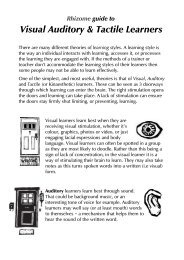Consensus Decision-making - Rhizome
Consensus Decision-making - Rhizome
Consensus Decision-making - Rhizome
You also want an ePaper? Increase the reach of your titles
YUMPU automatically turns print PDFs into web optimized ePapers that Google loves.
When they can see the whites of your eyes: Inemergencies, in situations where urgent andimmediate action is necessary, appointing atemporary leader may be the wisest course of action.When the issue is trivial: I have known groups todevote half and hour to trying to decide by consensuswhether to spend forty minutes or a full hour atlunch. Remember consensus is a thinking process –where there is nothing to think about, flip a coin.When the group has insufficient information:When you’re lost in the hills, and no one knows theway home, you cannot figure out how to get there byconsensus. Send out scouts. Ask: Do we have theinformation we need to solve this problem? Can weget it?Starhawk ‘Truth or Dare’. © Miriam Simos,published by Harper and Rowwww.starhawk.org/writings/truth-dare.htmlWe'd add:When there’s no collective decision to be made:Let's illustrate with an example - a group ofactivists gather to plan and take action. Perhapssome have come as organised affinity groups.(http://en.wikipedia.org/wiki/Affinity_group)Perhaps others are there as individuals. Theydiscuss tactics and identify potential targets and asthe meeting progresses ideas emerge and energygathers around them. There comes a stage where arange of ideas for action have been put forwardand people need to decide what action they want totake, if any. But it’s not a collective decision, just apersonal one – “where do I want to put my energy?what do I feel will be most effective.”There’s a strange dynamic that can emerge ingroups using consensus whereby they start tobelieve that full group sign-off is needed foreverything. So when an affinity group states thatthey have an idea for action that they are planningto take forwards, and invites others to join in, therecan be a response along the lines of “but we haven’tagreed we’re doing that particular action yet.” Theaction hasn’t been ‘authorised’ by the group.Secondly, and more seriously: when a group isn’twilling or able to grow. <strong>Consensus</strong> is anaspirational process. We talk in terms of equality,challenging oppression, including the margins of agroup, building the best possible proposal for thegroup, and more. Visionary stuff. How manygroups are genuinely capable of doing that all ofthe time? So we’re constantly working towardsconsensus. And if we ever get there? Well thenthere’s a particularly controversial decision to bemade, or we’re having an off day, or we have newmembers that have changed the dynamic of thegroup, and momentarily we’re a step back, strivingfor consensus all over again. If the group isn'tequipped for that journey they might want toreconsider using consensus.Many groups struggle to enact the values ofconsensus. Their process is full of competition, lacksempathy, is distrustful and intolerant. This cycle isvicious not virtuous and distrust deepens,intolerance intensifies. Before long you don’t somuch have the conditions for consensus as fordysfunction.Why is this different to Starhawk's “no groupmind”? Because in many such groups there’s plentyof potential for group mind – the shared values, ashared political analysis, shared aims or tactics arethere, and indeed that's often what brought thegroup together. But the group is focused, mentallyand emotionally, on difference and the differenceoverwhelms the similarities. This is usually reflectedin the process, which is paralysed by a large numberof blocks.The basic premise of consensus in large groups ismoving between small group (sub-group) discussion,at which level high quality, inclusive andparticipatory conversation can be held, to plenarydiscussion in which ideas can be aired and the finaldecisions taken. In most cases there will need to beseveral rounds of conversation. Within a largergroup communication needs to be more conscious.Any confusion or miscommunication is amplified inlarger groups.This kind of process still needs to have a foundationof that state of mind. Care needs to be taken to helpsupport and cultivate that, especially if a highproportion of those involved are new to consensus.www.rhizome.coop10 <strong>Consensus</strong> <strong>Decision</strong>-<strong>making</strong>





